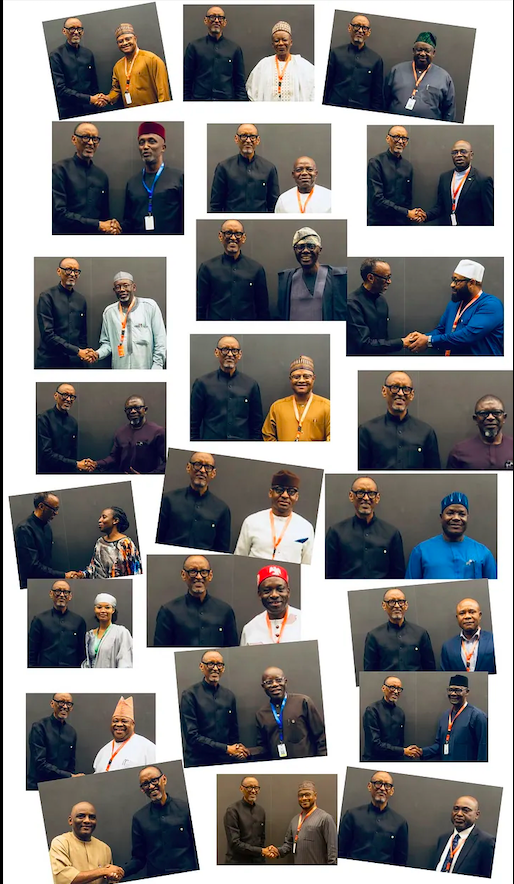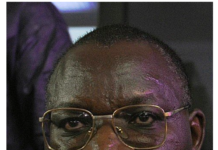By David Himbara
Kagame engineered the Nigerian leadership retreat in Rwanda
The brain behind the scheme of schooling Nigerian governors the science of governance and development was no other than the Rwandan strongman, General Paul Kagame. The UNDP which sponsored the gimmick announced that the Kigali retreat was held “under the invitation of His Excellency Paul Kagame, President of the Republic of Rwanda:”
“The retreat was dedicated to fostering dialogue on reimagining leadership and leveraging innovative technology, drawing inspiration from Rwanda’s transformative journey…Nineteen Nigerian States, engaged in sessions that explored Rwanda’s successful investment destination, transformation in digital technology, urban planning and socio-economic transformation, capping off with a candid private dialogue with President Kagame.”
Kagame fabricating a plan to impress the Nigerian governors with Rwanda’s socioeconomic transformation is no surprise. His delusions of grandeur have created a fantasized Rwanda that Kagame calls the “Singapore of Africa” a showmanship that helps distract from his grotesque human rights record. He relentlessly declares that Rwanda is an economic lion following the footsteps of the ‘Asian tigers’ of Korea, Taiwan, Hong Kong and Singapore, which spectacularly leaped from poverty to prosperity in a single generation.
Kagame sustains the big lie in two ways. First, he is a globetrotter with a mission to promoting his brand in different parts of the world. He has so far this year landed in fourteen countries, namely, Turkey; Bahamas; Trinidad and Tobago; Seychelles; Qatar; the UK; Tanzania; Zimbabwe; Guineau-Conakry; Guinea-Bissau; Benin; the US; Burundi and Senegal. Second, he actively entices to Rwanda prominent but gullible individuals and institutions to promote his vain pretensions. The invitation to teach Nigerian governors falls in this category.
A closer look at the Nigerian elephant and the Rwandan mosquitoe

Evidently, the Nigerian governors need some counselling in evidence-based and data-driven practices. Without evidence of Rwanda’s purported economic transformation, the governors and their entourages trekked to Kigali, some 4,596.2 km to learn how to govern. A one-hour desktop research would have revealed that Kagame’s Rwanda is a fool’s paradise.
- POPULATION: Nigeria is a country of 224 million versus Rwanda’s population of 13 million people.
- GOVERNANCE: Nigeria is in its 16th year of consolidating its democratic dispensation. It was back in 2007 when the then President Olusegun Obasanjo was stopped dead in his tracks in his bid to change the constitution so that he could run for a third term. Rwanda is its 29th year of dictatorship under a constitution that allows the current power-holder, General Kagame to stay in power until 2035.
- PRIVATE SECTOR/WEALTH-CREATION: Nigeria’s private sector is led by billionaire captains of industry such as Aliko Dangote, Abdul Samad Rabiu, Arthur Eze, Mike Adenuga, Cletus Ibeto, Femi Otedola, Jimoh Ibrahim, Orji Uzor Kalu, and Folorunsho Alakija. They are in manufacturing, agriculture, financial services, communications, technology, and entertainment sectors. These industries and businesses account for Nigeria’s GDP of US$477 billion, the largest in Africa. Rwanda’s GDP is US$13.3 billion. The government of Rwanda described the country’s private sector in 2022 in these terms: “Over 90% of all businesses are nascent, informal, and concentrated in the non-tradable sectors.”
- CLASSIFICATION OF INCOME LEVELS : Nigeria is a middle-income economy with a gross national income (GNI) per capita of US$2,140. With a per capita GNI of US$930, Rwanda is a low-income country.
- FOREIGN DIRECT INVESTMENTS: The stock of inflow foreign direct investment (FDI) in Nigeria stands at US$91 billion versus Rwanda’s inflow FDI stock of US$2.9 billion.
- EXPORTS OF GOODS AND SERVICES: Nigeria’s annual exports of goods and services stand at US$47.2 billion against Rwanda’s US$2.9 billion.
- eCONOMY: Nigeria’s financial and industrial capital, Lagos, has earned the name of Africa’s Silicon Valley or Yabacon Valley. Yabacon Valley is home to 493 tech companies with a total number of 2,658 investors and a cumulative funding of US$6.8 billion. Nigeria features startups such as Jumia, which made history in 2019, becoming the first African startup valued at $1 billion following its listing on the New York Stock Exchange. Other leading startups in Nigeria include IHS Towers (US$652 million); OPay (US$570 million); Flutterwave (US$484.6million); Andela ($381 million); Zola Electric (US$306 million); and Moove (US$253 million). Crucially, the Nigerian government supports the tech industry. For example, in March 2023, the government launched its US$618 million Investmentin Digital and Creative Enterprises (I-DICE). The I-DICE’s purpose is to enhance the funding of digital and creative startups. The number of tech startups in Rwanda stands at 42 companies with a 160 investor population. Most successful are two foreign companies. Zipline led by Keller Rinaudo Cliffton from the United States raised US$483 million, while Ampersand Electric Motorcycles headed by the New Zealander Josh Whale raised US$14 million. The rest of Rwandan startups numbering 40 raised US$32.6 million.
Former Nigerian Minister of Foreign Affairs, Professor Boleji Akimenyi, aptly summoned up the scandalous episode
Professor Akimenyi warned that Nigeria would “fall into the pit of shame” of our governors “going to Rwanda to learn how to govern.” After acknowledging that Kagame inherited an appalling situation in Rwanda when he came to power, Professor Akimenyi posed and answered the following question:
“And what did he come up with? Not allowing human rights, not allowing civil rights, one-man rule, one-man narrative…But a word of caution here. We saw one-man rule in a lot of the Francophone African countries and when the strong man died, they descended into civil war. I think the answer is still out there about whether it is going to be a successful experiment in Rwanda.”
General Paul Kagame should familiarize himself with the advice of Africa’s son, Chinua Achebe, one of the world’s most widely recognized and praised writers for his extraordinary works of the 20th century:
“Do not be in a hurry to rush into the pleasures of the world like the young antelope who danced herself lame when the main dance was yet to come.”
Stay tuned.
































































